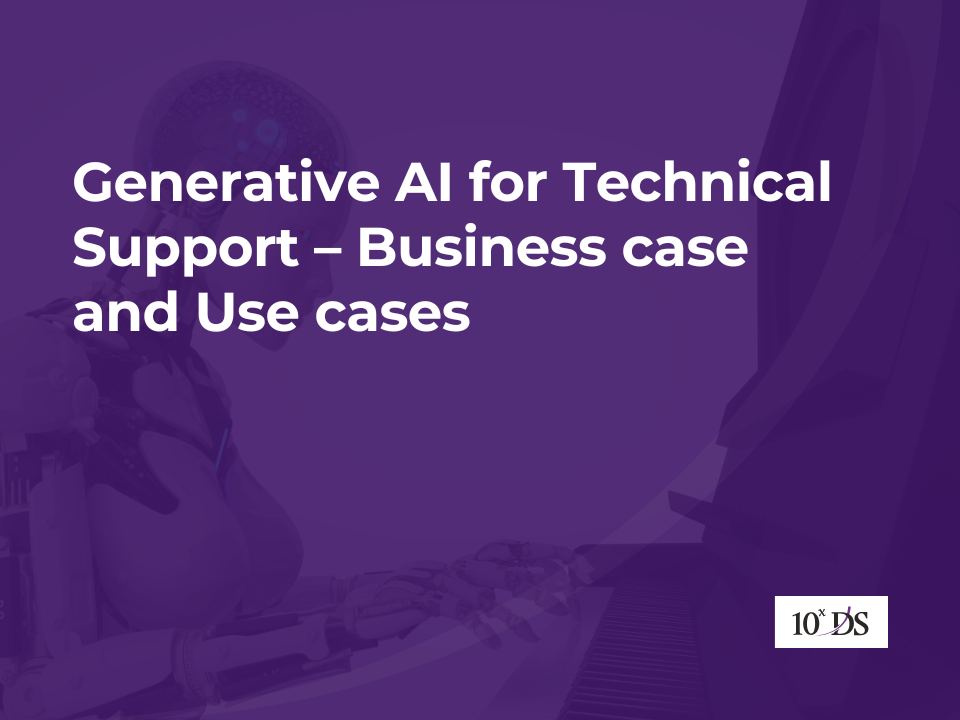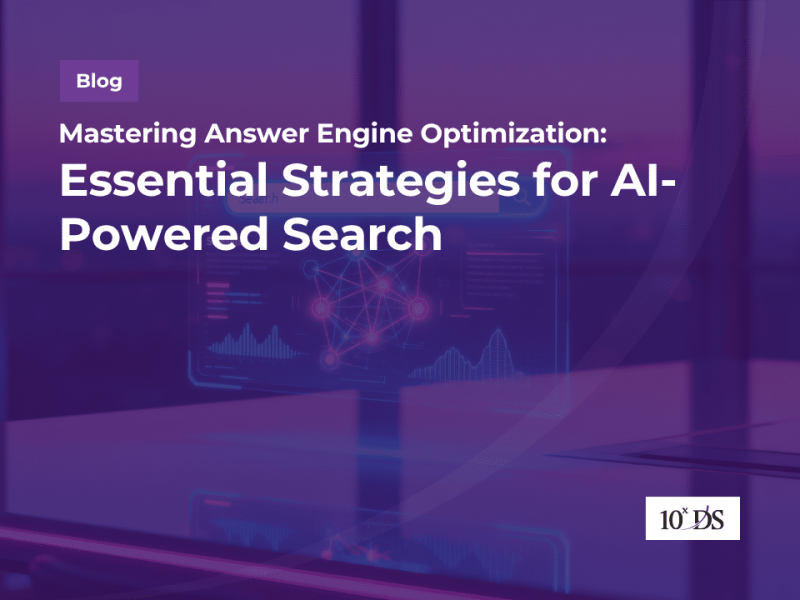
Generative AI for Technical support – Business case and Use cases
Technical support until recently, was largely dependent on human agents and traditional automated systems, such as rule-based chatbots and IVR (Interactive Voice Response). While human agents provided personalized and nuanced assistance, their availability was limited by working hours, training, and capacity to handle multiple queries. Customers often faced long wait times and inconsistent service quality, especially during peak periods. Automated systems could handle only simple, pre-scripted tasks, leading to frustration when faced with complex issues. Additionally, scaling support to meet growing customer demands was expensive and time-consuming, with high turnover rates in support roles further exacerbating the challenge. These limitations resulted in delays, reduced efficiency, and dissatisfaction for both customers and businesses.
The introduction of Generative AI is set to revolutionize technical support by addressing many of the inefficiencies and limitations of traditional systems.
Why are businesses using GEN AI for technical support?
Businesses have turned to Generative AI (Gen AI) for technical customer support due to a combination of challenges and opportunities:
- Rising Customer Expectations – Customers now demand 24/7 support, personalized solutions, and faster resolution times. Traditional support systems often struggle to keep up with these expectations, leading to customer dissatisfaction.
- Increased Volume of Support Requests – Many businesses face an overwhelming number of support inquiries, especially during product launches or service outages. Gen AI can handle a high volume of queries simultaneously, reducing wait times and improving efficiency.
- Cost Pressures – Hiring, training, and retaining large support teams can be expensive. Gen AI offers a scalable solution by automating routine tasks, reducing operational costs while maintaining quality.
- Complexity of Support Needs – Products and services are becoming more complex, requiring technical knowledge for effective support. Gen AI models can be trained on product manuals, documentation, and previous interactions to provide contextual and accurate responses.
- Skill Gaps in Support Teams – Not all support agents are equipped to handle advanced technical queries. Gen AI acts as an augmented assistant, providing agents with step-by-step solutions or directly answering customer questions.
- Data Utilization Opportunities – Businesses often have a wealth of support data (e.g., chat logs, FAQs) that Gen AI can leverage to create smarter, more informed systems. These AI systems improve over time through machine learning, becoming more effective with each interaction.
- Need for Multilingual Support – Expanding globally means providing support in multiple languages, which is challenging for human teams. Gen AI can handle queries in various languages, enhancing accessibility and inclusivity.
- Competitive Advantage – Adopting Gen AI enables companies to differentiate themselves by offering innovative and efficient customer experiences. Competitors who do not adopt similar technologies risk falling behind.
- Integration with Modern Communication Channels – Customers increasingly prefer digital channels like chat, social media, and email over phone calls. Gen AI is well-suited to these platforms, offering seamless integration and quick responses.
- Pandemic-Induced Changes – The COVID-19 pandemic accelerated digital transformation, pushing businesses to adopt automation technologies like Gen AI to meet remote support needs.
Businesses view Gen AI not just as a cost-saving tool but as a means to improve customer satisfaction, streamline operations, and remain competitive in a rapidly evolving market.
What are the use cases of Gen AI in technical support?
1. Automated Troubleshooting
Generative AI excels at automating the troubleshooting process by analyzing customer queries and cross-referencing product manuals, historical case data, and diagnostic algorithms. When a customer encounters a technical issue, such as a malfunctioning device or software error, the AI can guide them through a series of tailored steps to resolve the problem. For instance, if a customer reports internet connectivity issues, the AI could identify possible causes—such as configuration errors or hardware faults—and provide clear instructions to address each one. This automation not only speeds up problem resolution but also reduces the reliance on human agents for routine issues, enhancing the overall efficiency of technical support operations.
2. Personalized Customer Support
Gen AI enables highly personalized customer interactions by leveraging user-specific data, such as past queries, preferences, and account history. This ensures that responses are relevant and tailored to the individual’s context. For example, a customer who has previously experienced issues with their account login might receive proactive and precise guidance to avoid future disruptions. By understanding customer profiles and offering context-aware solutions, Gen AI enhances the quality of support and fosters stronger relationships between businesses and their clients. This personalization drives customer satisfaction and loyalty by showing a deep understanding of their unique needs.
3. 24/7 Multilingual Support
With Gen AI, businesses can provide consistent technical support across multiple languages and time zones. This capability is critical for companies with a global customer base. For example, an AI system can handle inquiries in Spanish, Mandarin, or French as effectively as in English, ensuring that customers worldwide receive assistance in their preferred language. Additionally, because Gen AI operates round the clock, customers can get support at any time, eliminating delays caused by traditional business hours. This combination of multilingual capability and 24/7 availability makes technical support more accessible and inclusive, improving customer experience across diverse markets.
4. Agent Assistance
Gen AI serves as an invaluable tool for support agents, acting as a real-time assistant during customer interactions. It can suggest troubleshooting steps, retrieve relevant information from the knowledge base, and even generate responses for the agent to use. For instance, while a customer explains a problem on a live call, the AI can analyze the issue and present the agent with recommended solutions or scripts. Moreover, Gen AI can automate tasks such as note-taking and case logging, allowing agents to focus on the conversation. This assistance boosts agent productivity, reduces errors, and ensures a higher standard of service delivery.
5. Proactive Support
Generative AI empowers businesses to offer proactive support by analyzing patterns and predicting potential issues before they affect customers. For example, if an AI system monitoring a cloud service detects unusual usage patterns or system vulnerabilities, it can notify the user with recommendations to optimize their setup or prevent downtime. This preemptive approach not only helps customers avoid disruptions but also positions the business as a proactive partner rather than a reactive service provider. By addressing issues before they escalate, proactive support builds trust and enhances the overall customer experience.
As Gen AI models become more sophisticated, they will handle increasingly complex queries, providing near-human conversational abilities and highly accurate problem-solving. The integration of Gen AI with emerging technologies, such as IoT devices, augmented reality (AR), and predictive analytics, will allow real-time diagnostics and solutions tailored to specific contexts. Proactive support will evolve further, with AI predicting and addressing potential issues before customers are even aware of them. Additionally, as privacy and data security improve, businesses will leverage Gen AI to build trust while maintaining compliance with regulatory standards. Ultimately, Gen AI will become a central pillar of customer support, enhancing collaboration between humans and machines to deliver seamless, intelligent, and proactive service experiences.
Talk to our experts to learn more.


